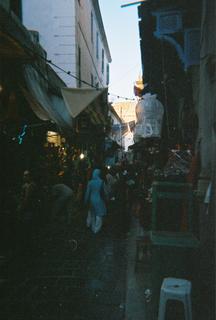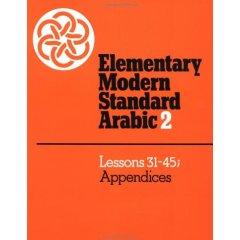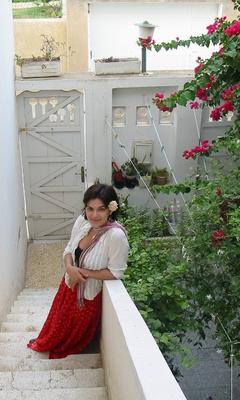The Carthage Beach
It's just a hop, skip, and a jump from our apartment, but often when I go there it's been more annoying than relaxing. Lots of pestering from curious or amorous locals. And last week I got my digital camera stolen. I had wanted to take a picture of my "Tunisian bathing suit" --- full-length cotton skirt and shirt, like many of the more modest local women wear swimming. And even though we thought we had one person monitoring the camera at every second, someone found a moment of opportunity to make it disappear.
But, now, I think I may finally be getting the hang of the Carthage beach. The key seems to be fitting in by dressing appropriately. Bikinis are mostly not worn by adult women (though they're a common sight on girls, up to about age eleven). More important than the top, however, is the bottom. Women usually wear shorts, a skirt, or a wrap over their swimsuit... apparently the display of cheek flesh and bikini lines is appropriate only for little children. Now that I've figured this out, I'm able to go on my own and mostly avoid attracting attention.
And yesterday, for the first time since I've been in Tunisia, somebody treated me like just another person, rather than as a customer or a tourist. I was lying on the beach reading my book (Albert Camus'
The Plague) and two girls, about 14 years old, came over and asked me in Arabic to watch their stuff while they went swimming. I didn't understand her words, and reflexively protested that I didn't really speak Arabic. So she said it again in French. The meaning was clear from context, and I guess my face seemed honest, so she smiled, and ran off into the water leaving me in charge of her bundle of clothes, wrapped up in a sheet.
Maybe eventually I will more or less fit in here.
But, now, I think I may finally be getting the hang of the Carthage beach. The key seems to be fitting in by dressing appropriately. Bikinis are mostly not worn by adult women (though they're a common sight on girls, up to about age eleven). More important than the top, however, is the bottom. Women usually wear shorts, a skirt, or a wrap over their swimsuit... apparently the display of cheek flesh and bikini lines is appropriate only for little children. Now that I've figured this out, I'm able to go on my own and mostly avoid attracting attention.
And yesterday, for the first time since I've been in Tunisia, somebody treated me like just another person, rather than as a customer or a tourist. I was lying on the beach reading my book (Albert Camus'
The Plague) and two girls, about 14 years old, came over and asked me in Arabic to watch their stuff while they went swimming. I didn't understand her words, and reflexively protested that I didn't really speak Arabic. So she said it again in French. The meaning was clear from context, and I guess my face seemed honest, so she smiled, and ran off into the water leaving me in charge of her bundle of clothes, wrapped up in a sheet.
Maybe eventually I will more or less fit in here.




